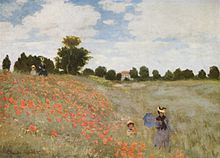Coquelicot ( /ˈkoʊklɪkoʊ/ KOHK-li-koh) is a shade of red. The term is originally the French name for the wild corn poppy, Papaver rhoeas, which is distinguished by its bright red color and orange tint.[2] It eventually passed into English usage as the name of a color based upon that of the flower. The first recorded use of this usage was in the year 1795.[3]
| Coquelicot | |
|---|---|
| Hex triplet | #FF3800 |
| sRGBB (r, g, b) | (255, 56, 0) |
| HSV (h, s, v) | (13°, 100%, 100%) |
| CIELChuv (L, C, h) | (56, 164, 15°) |
| Source | ColorHexa[1] |
| ISCC–NBS descriptor | Vivid reddish orange |
| B: Normalized to [0–255] (byte) | |
Claude Monet painted Les Coquelicots or Poppies Blooming in 1873.


See also
editReferences
edit- ^ "Coquelicot / #ff3800 hex color". ColorHexa. Retrieved 2021-11-06.
- ^ Webster's Unabridged Universal Dictionary, World Syndicate Publishing, N.Y., 1937
- ^ Maerz and Paul A Dictionary of Color New York: 1930 McGraw-Hill Page 193; Color Sample of Coquelicot: Page 27 Plate 2 Color Sample C10
- Cecil, David (1978). A Portrait of Jane Austen. Constable.